Read Business Sutra: A Very Indian Approach to Management Online
Authors: Devdutt Pattanaik
Business Sutra: A Very Indian Approach to Management (16 page)
The Jain classification of worthy beings suggests a similar pattern. Vasudev is witness to the movement of Lakshmi, the chakravarti is witness to Durga while the tirthankar sees Saraswati. Vasudev sees the world in economic terms, the chakravarti sees the world in political terms. Only the tirthankar understands that philosophy is the seed of all economic and political decisions; only he understands that every each human being has a different philosophy and only the wise are able to accommodate everyone's philosophy.
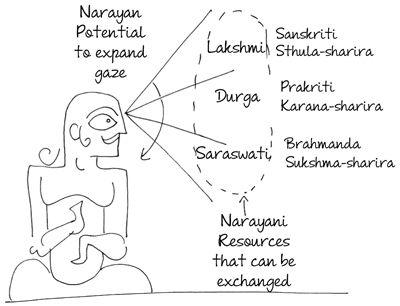
Nick is rich but he does not believe in charity. He does believe in investing though. He keeps investing in high-risk businesses and low-return businesses and is constantly creating opportunities where people can earn and, learn and grow. He does not need to do this. But he does it for fun, and to appreciate his own insecurities and anxieties that reveal themselves with each transaction. The more Nick learns about the world and himself, the more his business skills improve and he attracts more wealth. Even when an investment fails, he smiles, for with it comes more wisdom.
We have to make room for the Other
Animals focus on their hunger alone. They do not pay attention to each other's hunger, except when parenting because they do not have the wherewithal to do so. But humans do; this is also the Narayan potential.
By paying attention to other people's hunger, we get a glimpse of who they are. In other words, realizing the Narayan potential helps us do darshan. When we do darshan of others, we do darshan of ourselves. This makes us realize how much more Narayan potential there is to realize.
Initially, as children following parents, we are all unconditional followers (shudra varna). Gradually, we grow up, are able to shift focus from getting to giving, from being dependent to being dependable. Thus our varna changes. We become aware of our own needs and those of others. We rise from tamas-guna to rajas-guna, from shudra varna to vaishya or kshatriya varna.
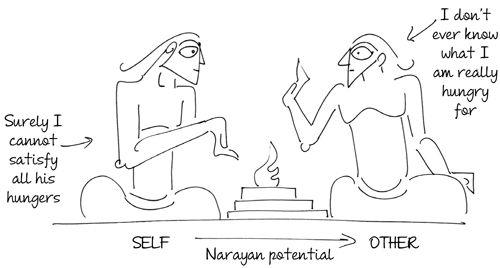
Changing varna is difficult; changing guna seems impossible. We prefer social growth to mental growth. We prefer things to thoughts. We do not trust Narayan's ability to attract Narayani. We would rather grab resources than invest in the potential. This is because at least some resources (Lakshmi) are tangible; potential (Narayan) is totally intangible. The quest for sattva-guna and brahmana varna is always difficult as along the way we get distracted by what we have or do (jati) and less by who we are and can be.
The Jain vasudev blames the exploitative and tyrannical prati-vasudev for the problems of society; the chakravarti believes upholding the law is the solution to all social problems. In the absence of wisdom, we tend to blame the Other, or seek solutions using external structures like law and wealth. Only the wisdom of the tirthankar reveals how expanding the imagination to include, enable and encourage the Other, brings peace and joy to everyone around.
Ravindra has a Rs. 7,000 crore company that makes spare parts for cars, planes and ships. That is why his peers adore him. But wealth and public adoration is not Ravindra's motivation. All his life he has sought to create an ecosystem that enables people to be entrepreneurs. For those who cannot be entrepreneurs he strives to create jobs. The turnover and profit are just outcomes of this ambition. But when he says this in forums people do not believe him. They would rather believe that greed is his motivation, especially since he prefers investing in businesses rather than engaging in charitable activities. They find all talk of mental growth exotic and all talk of resource growth pragmatic. Discussions on actions and rules excite them; discussions on thought, on the other hand, bore them.
Yagna can be a tool for personal growth, if we allow it to be
Fire's dharma is to burn because that is what it is capable of doing; water's dharma is to flow because that is what it is capable of doing; a plant's dharma is to survive by growing because that is what it is capable of doing; an animal's dharma is to survive by running after food and away from a predator, because that what it capable of doing; humanity's dharma is outgrowing fear by expanding the imagination because that is what it is capable of doing.
By expanding the mind, Brahma can outgrow hunger and fear, and realize the brahman. Humans do not have to compete for resources like plants or dominate the weak like animals; for them to do so is, in fact, adharma.
In mythological terms it means moving from being Daksha ("We must be right") and Indra ("I am right") towards Shiva ("Nobody is right") and Vishnu ("Everyone is right from their point of view but everyone has to face the consequences of their choices.")
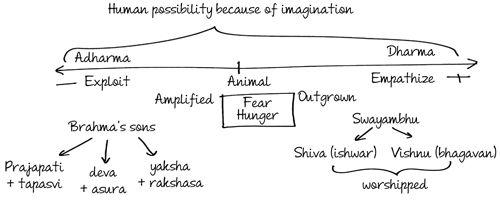
Daksha and Indra are sons of Brahma who get increasingly dependent on the yagna for their identity, while Shiva and Vishnu are swayambhu, increasingly self-reliant and having an identity which is independent of the yagna.
To become swayambhu—dependable, responsible yet autonomous—is dharma for humans. It is the realization of our potential. The alternative is to keep controlling nature; with control comes conflict—this is adharma. Adharma entraps us in hunger and fear; dharma grants us moksha, or liberation from conflict.
Shiva is called ishwar because his independence is accompanied by indifference for the Other; Vishnu is called bhagavan because although independent, he remains dependable. When Shiva opens his eyes and becomes a householder, he is called Shankar, and he is more like Vishnu. When Vishnu shuts his eyes, and goes to sleep and dreams the dreamless slumber as Narayan, he is more like Shiva.
Most humans are like Indra, seeking returns without investment. Indra needs help and Shiva can help, but neither looks at the Other. Daksha pays more attention to the yagna, than to the yajaman or the devata. Observing this, Vishnu smiles.
In most humans Narayan is asleep, which is why humans are called nara. Only nara can awaken the Narayan within him; no one else can do it for him. At best, the yajaman can provoke through the yagna. This is sanatan, or the timeless truth everyone can see if, like the rishis, we expand our gaze.
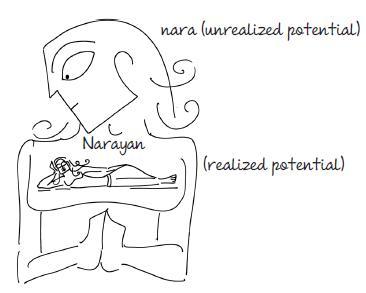
In Buddhist mythology, this idea is expressed as discovering the jewel (mani) by letting the lotus-mind (padma) bloom. In Jain mythology, it is expressed as discovering the tirtha just like the tirthankar. While inquiry into the nature of suffering establishes a Buddha, caring for the other transforms Buddha into Bodhisattva. The idea of the Buddha is celebrated in Theravada, the older school of Buddhism, while the idea of the Bodhisattva is celebrated in Mahayana, the later school of Buddhism.
When Priya reflects on her life, she realizes that with time she has changed. She used to be impatient and demanding, very rigid with her rules. But with time she has allowed herself to be more forgiving of others as well as herself. She is patient with other people's opinions. She does not convince anyone but instead slowly builds a consensus, not because it is the right thing to do but because she believes everyone is right from their point of view and it is a struggle to accommodate another's point of view. How can she expect others to do what took her a long time? Priya has risen in the corporate ladder and is a much sought-after professional; but that social achievement she knows is an outcome of mental maturity. She was once self-absorbed like Indra, then process-driven like Daksha, then withdrawn and wise like Shiva, but now she feels like Vishnu—focused on talent growth. It demanded the awakening of Narayan within her.
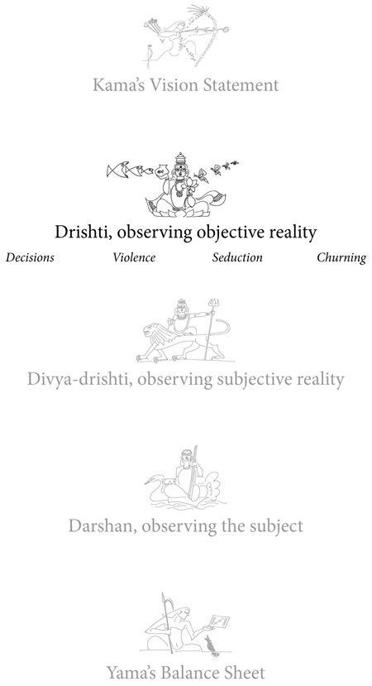
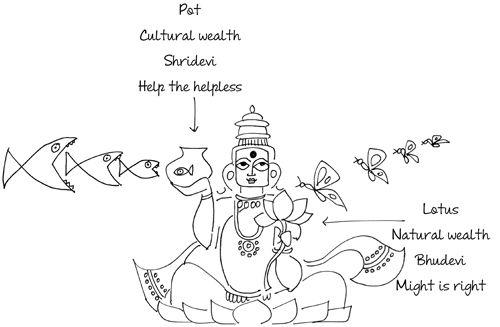
 he ability to see the human quest for wealth is drishti. Plants grow seeking sunlight and water. Animals run seeking pastures and prey. The fear of starvation makes food the ultimate target or 'laksh'. From laksh comes Lakshmi, the goddess of food, the embodiment of bhog or consumption. Lakshmi is the most primal of hungers; she sustains the physical body, or sthula-sharira.
he ability to see the human quest for wealth is drishti. Plants grow seeking sunlight and water. Animals run seeking pastures and prey. The fear of starvation makes food the ultimate target or 'laksh'. From laksh comes Lakshmi, the goddess of food, the embodiment of bhog or consumption. Lakshmi is the most primal of hungers; she sustains the physical body, or sthula-sharira.